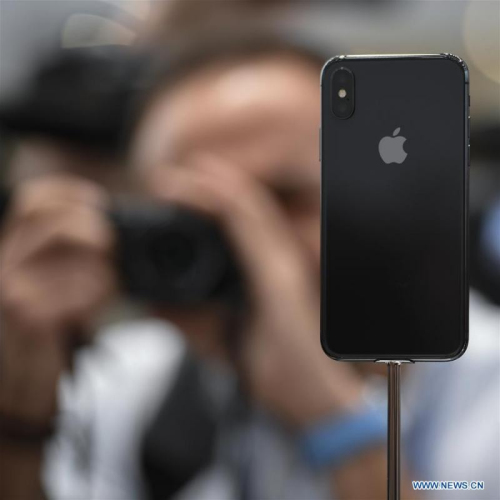
A man takes photos of new iPhone X displayed during a special event in Cupertino, California, the United States on Sept. 12, 2017. Apple Inc. released a series of new products and services in Cupertino on Tuesday. (Photo/Xinhua)
Early Wednesday morning, Huang Kaiwen read news on his iPhone as usual. Among the top news was the official launch of new iPhone models, held just hours earlier at midnight Beijing Time.
The smartphone has deeply impacted the life of the 26-year-old office worker in Shanghai: he listens to music, watches video, takes photos, surfs the Internet and even orders meals with his phone.
With the rising penetration of smartphones, users are spending more time on their phones and less using other devices, including computers, cameras and TVs.
"I used to watch videos, play games and listen music on a computer and take photos with a camera. Now I do most of these on my smartphone. I feel like I couldn't live without a smartphone," Huang said.
Apple released the iPhone X to commemorate the 10th anniversary of the iPhone. In 2007, the company's then founder, the late Steve Jobs, launched the first generation iPhone that helped bring in the smartphone era.
Besides an upgraded processor and camera, the flagship product comes with facial recognition and a larger screen, and abandons the fingerprint recognition and home button on earlier models. Apple CEO Tim Cook called it the future of the smartphone.
Apple also launched the iPhone 8 and iPhone 8 plus with fewer upgrades.
The company needs to inject a new catalyst into the market with a completely new design to boost sales as its fast-rising Chinese rivals are grabbing larger market shares, said Kitty Fok, president of research firm IDC China.
The new models are set to boost sales in the coming months, but could face fierce competition due to high prices of the flagship model, new products launched by rivals and more rational consumers, analysts said.
Huawei overtook Apple to become the world's second-largest smartphone maker in June and July, and is likely to hold that place with strong August sales, market research firm Counterpoint said in a research note last week.
Xiang Ligang, board chairman of the Zhongguancun Information Consumers' Federation, said despite the high prices, many consumers will still rush to buy new devices. But initial sales could be affected by output, he said.
Samsung will remain the largest smartphone maker with Apple and Huawei being locked in bitter battle for the second spot, Xiang said.
With more devices and lower prices to cash in on the huge number of domestic consumers, Huawei has the opportunity to retain the second place, as it did in June and July, Xiang said.
Apple still has its strengths. More of its users are loyal and ready to spend on expensive products, said Xu Yingbo from the research institute of CITIC Securities.
"More customers are expected to buy the iPhone X. I like its new facial recognition feature," said Huang.
Huang, who uses an iPhone 6s, said what attracts him to Apple is the stable iOS system and apps. He said the iPhone is just a tool and he currently has no plan to buy a new one.
Zhang Wenyan from a technology research institute in Shanghai said that hardware has entered a maturation period, and it is the operating system and apps that are key to user experience now and in the future.
"The smartphone makers that can offer a better user experience will win over consumers," said Zhang.
Apple has often been an industry leader over the past decade with features such as multi-touch and high-resolution retina screens, and fingerprint recognition. Its App Store also has changed the production and distribution of apps.
In recent years, many domestic brands, including Huawei, Xiaomi, OPPO and VIVO, have rolled out lower-priced rivals to help improve the smartphone penetration rate in China.
Smartphones have become a platform to completely change the way people communicate, get information, entertain and shop, and have triggered a start-up boom.
The iPhone has undoubtedly led the transformation of smartphones, according to Fok. It has helped nurture an ecosystem built around smart mobile devices, a driver of scientific innovation in this era, she said.


















































